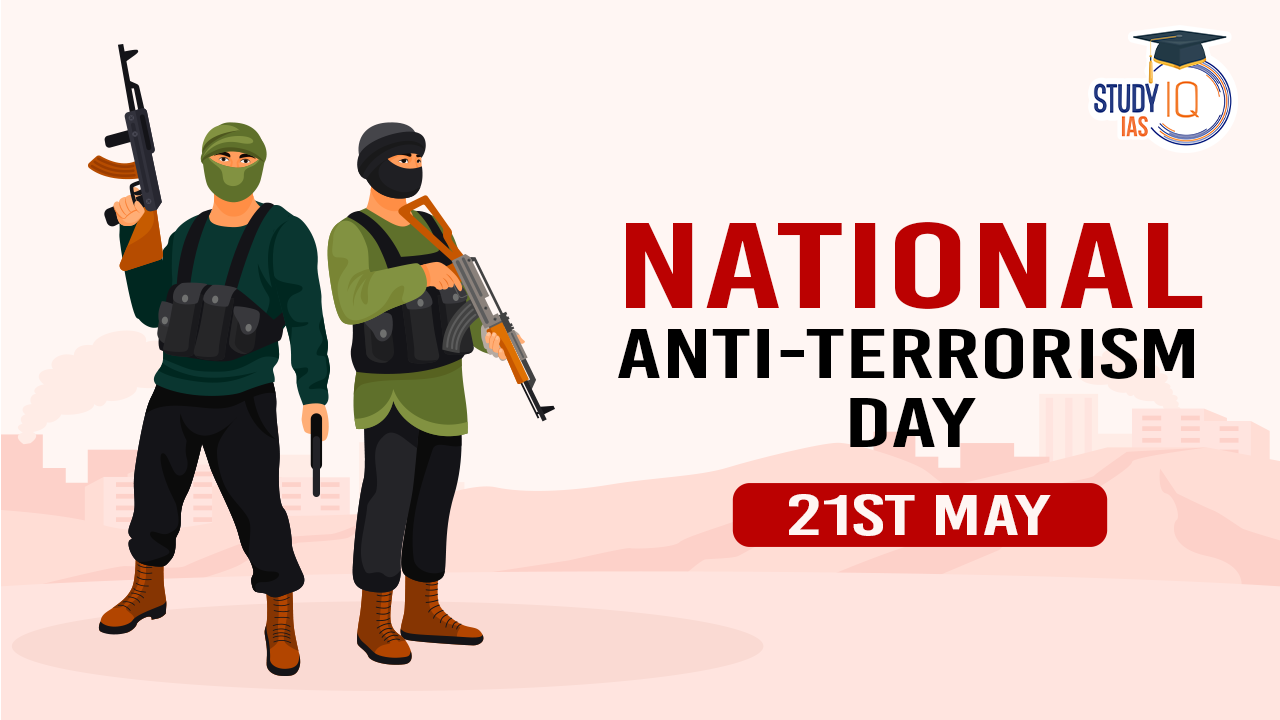Table of Contents
Anti-Terrorism Day is observed annually on May 21st in India. This significant day aims to educate the public, especially the youth, about the detrimental effects of terrorism on human lives and society. It underscores the necessity of combating terrorism and promoting national harmony, unity, and peace.
National Anti-Terrorism Day 2024
National Anti-Terrorism Day on May 21st in India commemorates the assassination of former Prime Minister Rajiv Gandhi in 1991. It raises awareness about terrorism’s grave threat and promotes unity against extremism. Activities include educational programs, tributes to victims, and awareness campaigns. Through pledges and digital initiatives, the day reinforces India’s commitment to peace and vigilance against terrorism’s menace, fostering a safer and more resilient society.
National Anti-Terrorism Day: Historical Background
The observance of Anti-Terrorism Day marks the death anniversary of former Prime Minister Rajiv Gandhi, who was assassinated on May 21, 1991. Rajiv Gandhi was killed in Sriperumbudur, Tamil Nadu, by a suicide bomber associated with the Liberation Tigers of Tamil Eelam (LTTE), a terrorist organization. The bomber, posing as a supporter, approached Gandhi during a public rally and detonated an explosive device, resulting in his death and that of approximately 25 others.
Following this tragic event, the Indian government, under Prime Minister V.P. Singh, officially designated May 21 as Anti-Terrorism Day to honor Rajiv Gandhi’s memory and to raise awareness about the grave threat posed by terrorism.
Objectives of Anti-Terrorism Day
The primary objectives of Anti-Terrorism Day include:
- Spreading the message of peace and humanity.
- Increasing awareness about the strategies and impacts of terrorist activities.
- Promoting national unity and fostering a sense of collective responsibility.
- Educating and training the youth to resist the allure of terrorist ideologies.
- Highlighting the dangers of terrorism to the society and the nation at large.
Observance and Activities
Various activities and programs are organized across the country to observe Anti-Terrorism Day:
- Debates and Discussions: Educational institutions like schools, colleges, and universities conduct debates and discussions on the dangers of terrorism and violence. These forums provide a platform for students to express their views and learn about the impact of terrorism on society.
- Mass Education Programs: Government and non-governmental organizations hold mass education programs to highlight the ill effects of terrorism and its aftermath. These programs aim to reach a broad audience, spreading awareness about the need to combat terrorism.
- Rallies and Parades: Both Central and State Governments organize rallies and parades to underscore the effects of terrorism and to promote unity and solidarity among citizens.
- Pledges and Tributes: In government offices, public sector undertakings, and other institutions, people take an anti-terrorism pledge, committing themselves to oppose terrorism and uphold peace. Special marches and gatherings are held to pay respect to Rajiv Gandhi and other victims of terrorism, often including moments of silence.
- Digital and Social Media Campaigns: Given the reach of digital platforms, innovative methods of propagating the anti-terrorism message through social media are encouraged. These campaigns aim to engage a wider audience, especially the youth, in the fight against terrorism.
Significance of Anti-Terrorism Day
Anti-Terrorism Day holds profound significance for several reasons:
- Promoting Peace and Humanity: The day emphasizes the importance of spreading messages of peace and humanity. It encourages individuals to rise above hatred and violence, fostering a society rooted in compassion and understanding.
- Raising Awareness: It aims to educate people about the dangers of terrorism and the methods employed by terrorist groups to instill fear. By increasing public awareness, the day seeks to prevent the recruitment and radicalization of young individuals by these groups.
- Fostering Unity: The observance promotes unity among people of different castes, creeds, and backgrounds. It strives to build a cohesive society where differences are celebrated, not exploited by terrorists.
- Honoring Victims: Anti-Terrorism Day also serves as a day of remembrance for all victims of terrorism, acknowledging their suffering and loss.
Conclusion
Anti-Terrorism Day is a crucial observance in India, reminding citizens of the persistent threat of terrorism and the need for collective action to combat it. By promoting peace, unity, and awareness, the day encourages people to look beyond their differences and work towards a harmonious society. As terrorism remains a global menace, Anti-Terrorism Day serves as a beacon of hope and a call to action for a safer, more peaceful world.
Sharing is caring!


 Miss Universe Winners List From 1952 to ...
Miss Universe Winners List From 1952 to ...
 Significance and History of Diwali Festi...
Significance and History of Diwali Festi...
 Asia Cup Winners List (1984–2025): Ind...
Asia Cup Winners List (1984–2025): Ind...

























